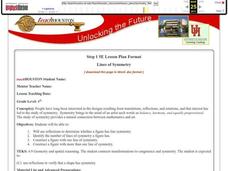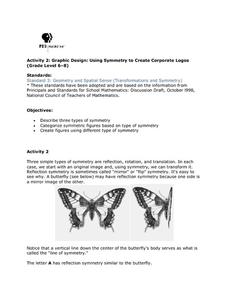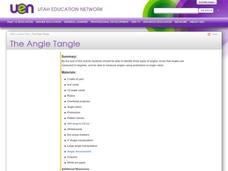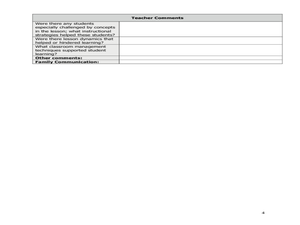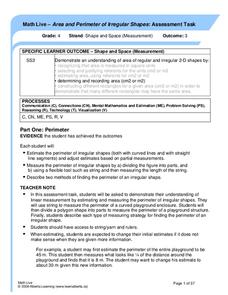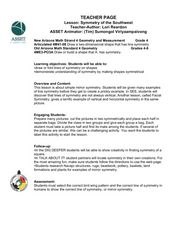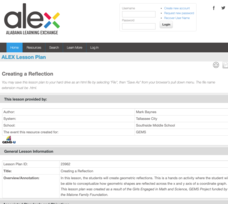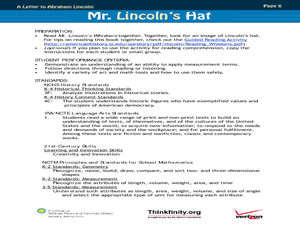Curated OER
Hoops: Grade 4 and 5
4th-5th graders will compete in a game similar to Jeopardy in which they answer questions from a variety of subject areas including science, language, and math. The questions are based on an extremely wide variety of topics, so would be...
Curated OER
My Test Book: Geometry skills
In this online interactive math skills worksheet, students solve 10 multiple choice math problems regarding geometry skills. Students may view the correct answers.
Curated OER
Lines of Symmetry
Fourth graders identify lines of symmetry using reflections and then construct figures that have one or more lines of symmetry. In this symmetry lesson plan, 4th graders use sets of shapes, pattern blocks, a mirror, and more.
PBS
Using Symmetry to Create Corporate Logos
Young mathematicians investigate the use of symmetry in graphic design. After first learning about reflection, translational, and rotational symmetry, children use this new knowledge to identify symmetry in letters of the...
CK-12 Foundation
Addition of Integers: Number Blocks
A five-question interactive provides a horizontal number line where integers are stacked on top of one another to find solutions of addition problems. Mathematicians move numbers to the numbers line, as numbers build higher, the sum of...
Curated OER
Daily Upkeep 7
In this geometry worksheet, 4th graders complete a quick set of math activities where they first identify which portion of a model is shaded in fraction form. Then, they select which angle best describes a given angle. Finally, students...
Curated OER
Coordinate Geometry
Grab your class and get them graphing polygons on a coordinate plane! They investigate the four quadrants, discover the x and y axis, and correctly plot ordered pairs. To show their comprehension, each child creates a coordinate picture...
Curated OER
Angles
Fourth and fifth graders investigate angles and name them according to the criteria for obtuse, acute, and right angles. They examine a human-made yarn pattern on the floor of their classroom and identify angles, vertices, and types of...
Curated OER
Symmetry in Relief
Students explore radial symmetry. In this 3 dimensional art and geometry instructional activity, students identify examples of radial symmetry in everyday objects. Students create an imprint using radial symmetry on clay tiles.
Noyce Foundation
Time to Get Clean
It's assessment time! Determine your young mathematicians' understanding of elapsed time with this brief, five-question quiz.
Alberta Learning
Area and Perimeter of Irregular Shapes
Evaluate young mathematicians' understanding of area and perimeter with this series of three assessment tasks. Challenging students to not only calculate the area and perimeter of irregular shapes, but to explain in writing their...
Curated OER
Design a Colonial Garden
Students explore botany by completing an art design activity in class. In this gardening history lesson, students identify the plants and crops utilized in the Colonial era for both food and medicine. Students utilize geometry to create...
Curated OER
Properties of Polygons, Parallel Sides, and Right Angles
Have fun with shapes! Third graders read a set of instructions and circle the shape in the description. They work on recognizing parallel sides and right sides. Use this resource as homework after your geometry lesson.
Curated OER
Symmetry of the Southwest
Fourth graders examine mirror symmetry. In this symmetry lesson, 4th graders discover that symmetry is not always vertical or horizontal. Students cut and fold shapes along lines of symmetry.
Curated OER
Geometry of Democracy
Young scholars explore the architecture of New England by identifying geometric shapes. In this architectural lesson, students examine photographs of classic building architecture and use a transparency to trace geometric shapes...
Curated OER
Hoops
With a creative premise involving a basketball competition, this game could be used to review basic science, grammar and math concepts in a fourth or fifth grade classroom. It is a fun idea, and a motivating way to review information....
Curated OER
Graph Paper Patterns
Young artists divide a piece of graph paper into sections using rectangles, squares, and triangles. They then fill each section with patterns of shape and color. Elementary graders describe how their patterns are organized. Secondary...
Curated OER
Mathematics Witing: Algebraic Processes and Its Connections to Geometry
Students, using manipulatives, determine how many different ways there are to arrange 3 and 4 objects. They organize and record their arrangements. Students investigate the pattern generated by 3 and 4 objects, they predict how many ways...
Alabama Learning Exchange
Creating a Reflection
Investigate geometric reflections in this geometry lesson. Create geometric reflections that show the reflection across the x and y axis of a coordinate graph. Learners watch a teacher demonstration before proceeding on their own. They...
Curated OER
Archaeology: Digging in the Classroom
Students explore how an archaeologist works and makes discoveries. In this archaeology lesson, students participate in a simulation in which they excavate broken pottery. Students use measurement, geometry, and observation skills during...
Curated OER
Naming Shapes
Students study geometric shapes and practice naming them properly. In this geometry instructional activity, students work in groups to give definitions of the vocabulary to each other in their own words. Students also visit a lower grade...
Think Map
Know Your Polygons!
Shape shifters recognize characteristics of polygons. Embracing language arts skills in addition to math, they use a thesaurus to pinpoint specific attributes of a set of polygons. They also participate in a 21-question guessing game...
Curated OER
Mr. Lincoln's Hat
Bring out the inner artist with this Abraham Lincoln lesson. Elementary students work on a home project creating a hat similar to Abraham Lincoln's hat. They will use geometry and measurement to create the scale of the hat, then...
Curated OER
Patterns Here, There, and Everywhere!
Upper graders access the Microsoft Word program and create patterns by utilizing certain keys on the keyboard. They create picket fences, smiley faces, and hearts. It seems that this lesson plan has as much to do with keyboarding skills...




